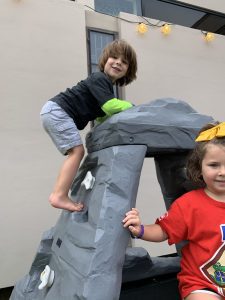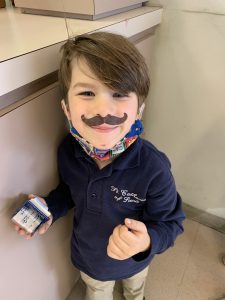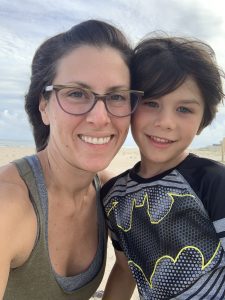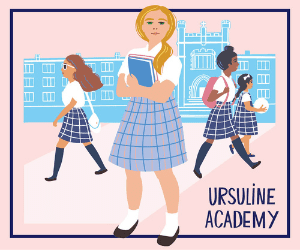I am the proud mom of a genuine free spirit, and I can honestly say that he has been that way since birth. He came blazing into the world (only 2.5 hours of labor total) on his precise due date and has not slowed down since. He is my barefoot loving, cape and undies wearing, king of the wild things. He is the perfect blend of sensitivity and fearlessness. He would do anything for anyone, but he is also wary of people (primarily adults) until you’ve shown him he can trust you. I ADORE all of that about him. There is not a single thing I would want him to change about my son. However, some of these personality traits have caused him to struggle a bit in school. So with a little bit of hesitation, we decided to have him evaluated by a child psychologist earlier this school year.  We set up an appointment over the Christmas break, and I agonized over how it would go. My son is currently in Kindergarten, so I had some hesitation about this entire process. He is still so young (5 at the time of the evaluation), but I want to give him every opportunity to be successful, so we went through with it. Typically my son doesn’t say much to new adults, especially in settings where he knows he is being assessed. So I told him, “you have a really cool brain, and this lady just wants to talk to you about how it works!” I wanted to make this process sound less clinical than it really was. In the first half of the assessment, I was able to stay with him, and that helped. “Maybe it will go ok,” I thought to myself.
We set up an appointment over the Christmas break, and I agonized over how it would go. My son is currently in Kindergarten, so I had some hesitation about this entire process. He is still so young (5 at the time of the evaluation), but I want to give him every opportunity to be successful, so we went through with it. Typically my son doesn’t say much to new adults, especially in settings where he knows he is being assessed. So I told him, “you have a really cool brain, and this lady just wants to talk to you about how it works!” I wanted to make this process sound less clinical than it really was. In the first half of the assessment, I was able to stay with him, and that helped. “Maybe it will go ok,” I thought to myself.
For the second half of the evaluation, I left the room to allow the psychologist to complete the cognitive assessment portion. I went to Chic-fil-A to get him his favorite lunch, and then I anxiously waited. And waited. When the evaluation was over, he seemed happy and proud of himself, which put my heart at ease. The last thing any parent wants is for their child to feel negative about themselves after an evaluation like that. We went on to have a great remainder of the Christmas break, and I admittedly forgot about the evaluation. And then the report came in the mail.
Understanding a Psychological Evaluation
If you’ve never had to have your child evaluated, I envy you. Reading through a report where your child has been deduced to diagnoses can be heartbreaking for any parent. Here is where I would like to say that I am extremely grateful for the multiple professionals, including teachers, school administrators, mental health coaches, psychologists, social workers, and counselors who make this their full-time profession. I respect it, I know that – like me – they dedicate themselves to their profession, and I know that they want the very best for their patients and students, too!
However, and this is a purely personal perspective about our journey, reading about my precious son spoken of in such clinical terms brought me to tears. Yes, I see many of the same things the psychologist saw. I’m not blind to his struggles, but he is so much more than that report. Words on paper are not alive in the same way that he is. Our son is loving, thoughtful, kind, inquisitive and so much more. Her final diagnosis was ADD, social anxiety disorder, and generalized anxiety disorder. Her very first recommendation was medication (ADD meds and anti-depressants, to be specific).
Do ADD Medications Have a Place?
Before we jump into medications and their role in various diagnoses, I would like to share that each and every parent knows their child, their situation, and their personal comfort level the best. There is no doubt that mental health professionals and teachers intend to offer the best advice. I know that medications have their place, and they are absolutely necessary sometimes. But anti-depressants?! If I am being transparent about our journey, that seemed – and still seems – so extreme to me for a 5-year-old. Thankfully, there were also recommendations within the report for accommodations we can implement at home and school. That’s the route we have decided to try for now. If I may bear my heart for a moment, I have to share that the antidepressant recommendation ate at me for weeks. Naturally, I began talking to other moms about it.
necessary sometimes. But anti-depressants?! If I am being transparent about our journey, that seemed – and still seems – so extreme to me for a 5-year-old. Thankfully, there were also recommendations within the report for accommodations we can implement at home and school. That’s the route we have decided to try for now. If I may bear my heart for a moment, I have to share that the antidepressant recommendation ate at me for weeks. Naturally, I began talking to other moms about it.
Many other moms I encountered had experienced similar situations, being told their children were falling behind in school and exhibiting signs of anxiety. And then it hit me like a TON of bricks. These kids (those in my son’s grade, specifically) have lived a third – ONE THIRD – of their lives in an unprecedented pandemic. They have spent prime developmental years isolated / “socially distanced,” masked, and being told that socializing (close contact) is dangerous. These kindergartners have been separated into pods, limited from friends in other classes, unable to do many of the things that are critical for social and academic development in these early years. It’s no wonder so many of them are struggling with anxiety, overly shy, and unwilling to speak to “strangers.” Are we actually surprised that these young children are struggling in school? How can they efficiently learn things like phonetics when they cannot even see their teacher’s mouth? These are rhetorical questions, of course.
High Expectations on Kids in Unusual Times
To put it bluntly, we are expecting – and in some cases demanding – normalcy out of these children who have never seen a normal school in their short academic careers. We are ready to immediately medicate them with anti-depressants! Again, let me reiterate that anti-depressants have their place and absolutely should be considered. However, I am very specifically talking about my journey with my 5-year-old son who has spent the past 2 years living in a state of heightened anxiety. It’s hard not to wonder, is he anxious on his own or did we – as a society – possibly create some of this? We have modified how children play, learn and socialize, yet we have not modified any of the expectations we place on them in an academic setting. We seem surprised when they are behind in reading and phonetics, but they’ve been learning from behind a mask for two solid years. Let me be honest with how I personally feel right now; it’s maddening! Then consider a child like mine, who may have likely struggled with ADD sans pandemic and it’s a recipe for disaster.
The pandemic has been hard on everyone, but as a mom, I fear it has affected our children the most. I lie awake at night wondering what the long-term repercussions will be for them. Our children deserve better than what they have experienced the last 2 years. They deserve a true chance to excel. In order for that to happen, we have to change our expectations. If we plan to continue modifying how they learn and play, then we need to modify the parameters we use to determine “success.” We have to understand that many  of them will likely be “behind” if they continue to have to quarantine, communicate behind masks and/or virtually learn. We have to do better … for them. Either in our implementation or our expectations, although it’s probably wise that we adjust both.
of them will likely be “behind” if they continue to have to quarantine, communicate behind masks and/or virtually learn. We have to do better … for them. Either in our implementation or our expectations, although it’s probably wise that we adjust both.
And that is why this momma bear will continue to fight for her son. I will fight for him to receive the support he needs to be successful in school. I will fight for him to be shown grace and understanding when he doesn’t pick up on an academic skill right away. I will continue to voice my concerns about masking, quarantining, and the like because of the clear effect it is having on mental health and learning. I will not expect my son to change who he is just to fit the unrealistic expectations of these strange times we are living in. And when I feel really overwhelmed, I remind myself that God made my son exactly as he is, exactly for this time. He did the same for your babies as well mommas! Just remember that.
















I am truly concerned about the number of children that are being diagnosed with some type of anxiety disorder. Even though COVID has created more anxiety than previously, this was on the rise prior to COVID. What in the heck is going on that is making kids so anxious? Too many high demands at school? Too much peer pressure? There is a problem and we need a solution.
I am as well! I wish I knew the answer. I think those are questions we should all be asking. Thank you for sharing your input
Thank you for writing this!
You’re so welcome!!